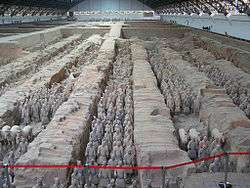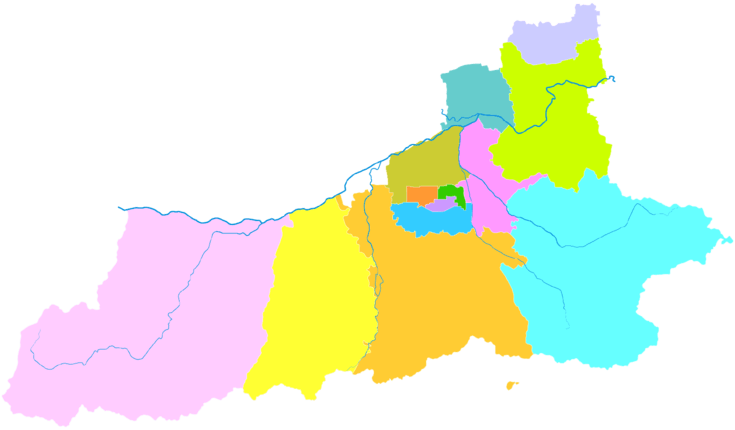Lintong District
| Lintong 临潼区 | |||||||||||||||||||||||||||||||||||
|---|---|---|---|---|---|---|---|---|---|---|---|---|---|---|---|---|---|---|---|---|---|---|---|---|---|---|---|---|---|---|---|---|---|---|---|
| District | |||||||||||||||||||||||||||||||||||
|
The Terracotta Army | |||||||||||||||||||||||||||||||||||
| Coordinates: 34°22′31″N 109°13′04″E / 34.3754°N 109.2177°ECoordinates: 34°22′31″N 109°13′04″E / 34.3754°N 109.2177°E[1] | |||||||||||||||||||||||||||||||||||
| Country | People's Republic of China | ||||||||||||||||||||||||||||||||||
| Province | Shaanxi | ||||||||||||||||||||||||||||||||||
| Sub-provincial city | Xi'an | ||||||||||||||||||||||||||||||||||
| Area | |||||||||||||||||||||||||||||||||||
| • Total | 915.97 km2 (353.66 sq mi) | ||||||||||||||||||||||||||||||||||
| Population (2010)[2] | |||||||||||||||||||||||||||||||||||
| • Total | 655,874 | ||||||||||||||||||||||||||||||||||
| • Density | 716.04/km2 (1,854.5/sq mi) | ||||||||||||||||||||||||||||||||||
| Time zone | China Standard (UTC+8) | ||||||||||||||||||||||||||||||||||
| Postal code | 7106XX | ||||||||||||||||||||||||||||||||||
| Xi'an district map |
| ||||||||||||||||||||||||||||||||||
| Website |
lintong | ||||||||||||||||||||||||||||||||||
Lintong District (simplified Chinese: 临潼区; traditional Chinese: 臨潼區; pinyin: Líntóng Qū) is one of nine districts of Xi'an, the capital of Shaanxi province, China. The Terracotta Army and the Mausoleum of the First Qin Emperor was discovered in March 1974 near this district. The district borders the prefecture-level cities of Xianyang to the northwest and Weinan to the east, Gaoling County to the northeast, Baqiao District to the southeast, Lianhu and Xincheng Districts to the south, and Chang'an District to the southwest.
The National Time Service Center, the Chinese Academy of Sciences (中国科学院国家授时中心), formerly known as Shaanxi Astronomical Observatory (陕西天文台), was established in 1966 in Lintong responsible for the time standard in mainland China. It was renamed to its present name in 2001.
The name of the district comes from two rivers. Lin river is on the east side and Tong river is on the west side of the district.
Lintong is headquarters of the 47th Group Army of the People's Liberation Army, one of the two group armies that comprise the Lanzhou Military Region responsible for defending China's northwest borders.
References
- ↑ Google (2014-07-02). "Lintong" (Map). Google Maps. Google. Retrieved 2014-07-02.
- ↑ "西安市2010年第六次全国人口普查主要数据公报" (in Chinese). Xi'an Evening News (西安晚报). 25 May 2011. Retrieved 3 July 2014.


